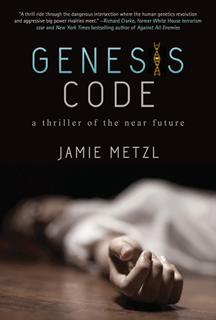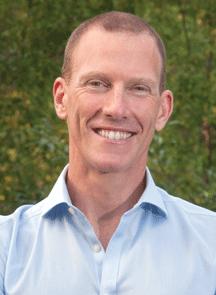
Jamie Metzl has spent a lot of time dealing with national security issues. He has served in the Clinton White House as a member of the National Security Council, worked in the State Department and as a staffer in the Senate Foreign Relations Committee. He also served with the United Nations in Cambodia. A man of many talents, he also was executive vice president of the Asia Society and is presently a principal in a global investment company. One topic that has piqued his interest in recent years is the national security implications of the genetics revolution.
{mprestriction ids="1"}After writing a number of articles on the topic, Metzl, who grew up here in Kansas City and attended both the Hyman Brand Hebrew Academy and The Barstow School, started to feel that the low level of public awareness of these issues did not match their importance and decided to write about them in story form to help address that problem. His new novel "Genesis Code: A Thriller of the Near Future" (Arcade/Skyhorse) is being released Nov. 4, and Metzl will be in Kansas City promoting it on Nov. 10. (See box for more information.)
"Genesis Code" is described as a futuristic thriller and "a frightening look at a new kind of superpower race — of humans." Women have been impregnated by a fertility clinic with genetically enhanced embryos — completely unaware the embryos are genetically enhanced. As these impregnated women start getting murdered one at a time, an Armenian-American reporter for the Kansas City Star begins trying to figure out who is killing these women and why, and whether any others like them may still be alive.
One of Metzl’s big missions in life is to get people talking about important global challengee, and he thought writing books could accomplish that.
"Two issue that I have been very focused on in my life and work is the rise of Asia and the big picture implications of revolutionary science," he said, noting he has written both fiction and non-fiction about these topics.
His first book was a history of the Cambodian genocide. He next chose to write a novet, "The Depth of the Sea," because he felt people can often learn and absorb things more through stories. Metzl describes some advice from his former mentor now friend Richard Clarke, who he worked with at the White House.
"Dick used to always say that if everybody in Washington is focusing on one issue, we can be sure that there is some even more important issue that’s off their radar," Metzl explained.
Through this advice he started believing that the "issues of the implications of the genetics revolution were so enormous they were almost too big for us to even think about." He wrote several articles on the topic, publishing the most recent one in Foreign Affairs ("The Genetics Epidemic: The Revolution in DNA Science — And What To Do About It," http://www.foreignaffairs.com/articles/142180/jamie-f-metzl/the-genetics-epidemic).
"As someone who writes both fiction and non-fiction I felt like I wanted to write and needed to write a work of fiction that talked about what it would look like and how would it feel when genetically enhanced people begin showing up among us. That was the genesis, if you will, of ‘Genesis Code.’ "
He’s spent about four years on the book. The pre-publication reviews have all been"extremely positive, a good sign for the book.
"I hope that streak will continue," Metzl said.

Kirkus Reviews calls it "an old-fashioned hard-boiled thriller that addresses up-to-the-minute political currents as seen from a short time in the future. "Metzl knows his science, and the detail is elegantly done while the novel moves at a nonstop pace over 41 days. Metzl provides a believable look at a not-too-distant future where science, politics, religion, economics and the ability to report the ‘truth’ are all inseparably bound together."
The entire book, with a few small exceptions, is set in Kansas City. Metzl chose to do that because he knows and loves the city.
"When genetically-enhanced people start to show up, they won’t just be in New York and Washington, they’ll be in real places where people live. For me Kansas City is the kind of place that people can associate with and feels somehow familiar."
The characters in this book are not Jewish, but Metzl said there are many similarities between Armenian-Americans and Jewish Americans.
"My Jewish background made writing that character a lot easier. But in the sequel of ‘Genesis Code,’ which is called ‘Eternal Sonata,’ there is a much stronger Jewish and Israel angle."
The sequel is already written in draft form, but it hasn’t yet been submitted to the publisher. He thinks it will probably take about two years for it to be published.
Metzl hopes people in Kansas City will enjoy "Genesis Code" and that it can help spark a national and global conversation about the huge implications of the ongoing revolution in human genetics.
"I really hope that people will not only read the book, but also use the book as a springboard for conversations with their friends about what will it mean when our species, after 250,000 years of evolution, suddenly has the ability to actively manage our evolutionary process. It’s such a huge idea, it’s so difficult for any of us to even fathom what it means, so now is the time that we need to be having those conversations." {/mprestriction}